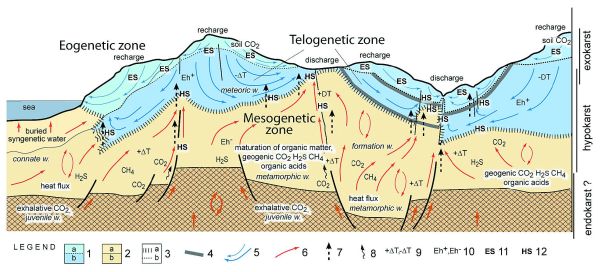The Karst Paradigm: Changes, Trends and Perspectives
DOI:
https://doi.org/10.3986/ac.v44i3.2996Povzetek
The paper examines representative definitions of karst (21), and discusses some concepts that influenced the modern understanding of the phenomenon. Several trends are discussed that took karst science beyond the limits of the traditional paradigm of karst. Dramatic progress in studies of speleogenesis plays the most significant role in changes taking place in the general understanding of karst. Also important is an adoption of the broad perspective to karst evolution which goes beyond the contemporary geomorphologic epoch and encompasses the entire life of a geological formation. Speleogenesis is viewed as a dynamic hydrogeological process of self-organization of the permeability structure in soluble rocks, a mechanism of the specific evolution of the groundwater flow system. The result is that these systems acquire a new, "karstic", quality and more complex organization. Since almost all essential attributes of karst owe their origin to speleogenesis, the latter is considered as the primary mechanism of the formation of karst. Two fundamental types of speleogenesis, hypogene and epigene, differentiate mainly due to distinct hydrodynamic characteristics of the respective groundwater flow systems: (1) of layered aquifer systems and fracture-vein flow systems of varying depths and degrees of confinement, and (2) of hydrodynamically open, near-surface unconfined systems. Accordingly, two major genetic types of karst are distinguished: hypogene and epigene. They differ in many characteristics, notably in relationships with the surface, hydrogeological behaviour, groundwater quality, and the areas of practical importance and approaches to solving karst-related issues. Although views on essential attributes of karst have been clearly changing, this was not reflected in definitions of the notion which are in broad use in the earth-science literature. A refined approach is suggested to the notion of karst in which it is viewed as a groundwater (fluid) flow system of a specific kind, which has acquired its peculiar properties in the course of speleogenesis.
Kraška paradigma: spremembe, trendi in perspektive
Dokument obravnava reprezentativne definicije krasa (21) in obravnava nekatere koncepte, ki so vplivali na sodobno razumevanje tega pojava. Razpravlja o več trendih, ki so popeljali krasoslovje preko meja tradicionalne paradigme krasa. Dramatični napredek v speleogenetskih raziskavah je igral najpomembnejšo vlogo pri spremembah, ki so se zgodile pri splošnem razumevanju krasa. Prav tako je za razvoj krasoslovja pomembno sprejetje široke perspektive, ki presega sodobno geomorfološko epoho in zajema celoten geološki razvoj. Speleogeneza je predstavljena kot dinamični hidrogeološki proces samoorganizacije stopnje prepustnosti posameznih struktur v topnih kamninah, to je kot mehanizem specifičnega razvoja sistema toka podzemne vode. Posledica tega je, da ti sistemi potrebujejo novo, "kraško", kakovostno in bolj kompleksno organizacijo. Ker skoraj vse bistvene značilnosti krasa izvirajo iz speleogeneze, je slednja šteta kot primarni mehanizem za nastanek krasa. Dve temeljni vrsti speleogeneze, hipogena in epigena, se razlikujeta predvsem zaradi različnih hidrodinamičnih značilnosti posameznih sistemov toka podzemne vode: (1) plastoviti vodonosni sistemi in tokovni sistemi po prelomih in žilah različnih globin in stopenj zaprtosti, ter (2) hidrodinamično odprti in plitvi sistemi. Posledično razlikujemo dva velika genetska tipa krasa: hipogeni in epigeni. Med seboj se razlikujeta v mnogih značilnostih, predvsem v odnosih s površjem, po hidrogeološkem obnašanju, kakovosti podzemne vode, ter na področjih praktičnega pomena in pristopov k reševanju vprašanj, povezanih s krasom. Čeprav so se stališča o bistvenih lastnostih krasa spreminjala, se to ni odrazilo v opredelitvi pojma, ki se na splošno uporablja v vedah o Zemlji. Pri predstavah o krasu predlagamo dodelan pristop, v katerem je poudarek na sistemu podzemne vode (tekočine) s specifičnim načinom pretakanja, ki je pridobilo svoje značilne lastnosti prav tekom speleogeneze.
Prenosi

Prenosi
Objavljeno
Kako citirati
Številka
Rubrike
Licenca
Avtorji jamčijo, da je delo njihova avtorska stvaritev, da v njem niso kršene avtorske pravice tretjih oseb ali kake druge pravice. V primeru zahtevkov tretjih oseb se avtorji zavezujejo, da bodo varovali interese založnika ter da bodo povrnili morebitno škodo.
Podrobneje v rubriki: Prispevki




